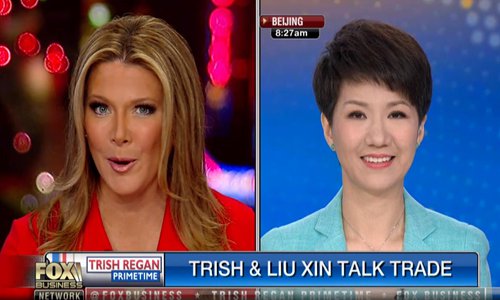TV debate exposes US bias against China: analyst
By Wang Cong Source:Global Times Published: 2019/5/30 21:18:41
FM welcomes ‘rational, open, frank’ dialogue under trade tensions

A screen shot of Liu Xin of China Global Television Network appearing on Trish Regan's show on Fox Business Network on Thursday Beijing time Photo: IC
A heated online feud between two high-profile news anchors from China and the US ended on Thursday morning in a seemingly friendly manner, but also laid bare the prejudice of some US elites against China.
The highly anticipated debate between Liu Xin of China Global Television Network (CGTN) and Trish Regan of the Fox Business Network, hailed as a first of its kind, also underscored the urgent need for the two countries to conduct better engagement as the trade and technology war has escalated to dangerous levels, Chinese analysts noted Thursday.
After days of hype, Liu appeared on Regan's primetime show Thursday morning Beijing time, where the two anchors went head-to-head over a wide range of issues, from the ongoing trade war to China's economic system.
Many in China praised Liu's performance for pushing back Regan's questions with clearly biased connotations, despite Liu being at a disadvantage because it was the US anchor's turf and she was in control of the conversation.
"Liu was very calm and showed great demeanor; in contrast, [Regan] appeared to be fanning the flames, instigating war and judging from an established angle," one Sina Weibo user wrote.
Clear prejudice
Despite her apparent attempt to appear fair and friendly with occasional smiles, Regan's prejudice was palpable throughout the showdown lasting around 16 minutes.
She started off the conversation by introducing Liu as a member of the Community Party of China (CPC) and painted Liu as a spokesperson of the CPC, drawing an immediate rebuke from Liu, who said she was not a CPC member.
"Please don't assume," Liu said. "I'm here today, only speaking for myself as Liu Xin, a journalist working for CGTN."
"Right off the bat, [Regan] put a huge label on Liu, saying Liu was representing the CPC… so the American was obviously biased," another Sina Weibo user wrote. Some online even pointed out that there were about 88 million CPC members and 1.4 billion people in China. "How hard can it be to understand that?" one wrote.
After mumbling about unsupported claims that China steals US technologies, Regan dropped another ideologically biased question, while appearing to be asking about China's economic system: "How do you define state capitalism?"
As she did throughout the show, Liu responded with sound arguments, educating the US anchor about China's socialist economy with Chinese characteristics, where market forces play an increasingly bigger role and the private sector is a major force in the economy.
"Such prejudice [against China] has long existed in the US," said Liang Haiming, dean of Hainan University's Belt and Road Research Institute, who also focuses on China-US trade relations. "This will not change from one exchange like this."
Better dialogue
However, Regan, who had fiercely defended the trade war the US government has initiated against China without concrete proof, did show a much softer tone and even appeared to be backing down from some of her earlier comments.
The showdown on Thursday appeared to be friendlier than their earlier fiery exchanges online, drawing praise from some Chinese and even Chinese officials.
Reacting to the debate, Lu Kang, spokesperson for China's Foreign Ministry, said that he was happy to see "rational, open and frank" dialogue between Chinese and US people in different areas.
At a time when tensions between the two economic powers are running high, the two countries need more effective dialogue rather than constant finger-pointing and the debate might have set a great example for that, analysts said.
"This is like in 1971, when the US ping-pong team was invited to China. No one remembers who won the matches, but people remember only that the US team went to China," Feng Da Hsuan, chief adviser of the China Silk Road iValley Research Institute and former vice president for research at the University of Texas at Dallas, told the Global Times, referring to a ping-ping match that has been widely credited as the start of China-US diplomatic relations in the early 1970s.
RELATED ARTICLES: